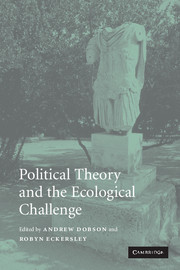2 - Liberalism
Published online by Cambridge University Press: 06 July 2010
Summary
It is not uncommon to point to liberalism as the evil genius behind the ecological crisis. In this chapter, I shall argue that there were once good grounds to suspect liberalism of at the very least a certain indifference towards ecological challenges – yet this attitude is changing dramatically. Interest in environmental issues does not come naturally for liberalism, but its internal checks and balances are slowly yet perceptibly greening liberalism.
It is important in this context to distinguish between liberalism as a ‘pure’ political theory, and the practice of liberalism or the practices ascribed to liberalism, such as the free market and liberal democracy. Classical liberalism, especially, supports the idea of a free market, as it sees freedom of enterprise and freedom of trade as necessary conditions for the realisation of individuals' plans of life. Yet that does not necessarily mean that each and every existing free market system or each and every effect of free market enterprise is desirable or defensible from a liberal perspective – involuntary exploitation of humans through slavery or rape, for instance, never is.
Critique to the effect that liberalism is a threat to the world's ecology comes in many forms, and as it turns out, not all are appropriate. At the deepest philosophical level, critics argue that liberalism is a child of the Enlightenment from which it has inherited its parent's deficiencies (cf. Sagoff 1988). Primary among these defects are René Descartes' body/mind, mind/matter, human/nature and nature/culture dichotomies.
- Type
- Chapter
- Information
- Political Theory and the Ecological Challenge , pp. 20 - 34Publisher: Cambridge University PressPrint publication year: 2006
References
- 12
- Cited by



